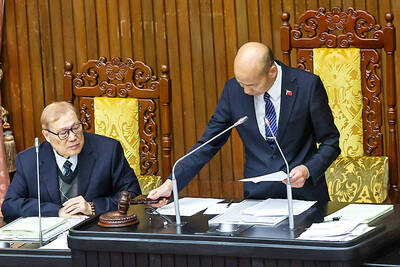Asia's recovery from the 1997 financial crisis carries a message of hope that the IMF and World Bank plan to highlight during their annual meetings in Singapore.
While the question of whether a decision to give more voting power to China, South Korea, Turkey and Mexico will be ratified by the IMF board of governors is commanding attention, the institutions regard Asia's rebound as an example to be heeded.
The world's financial elite of bankers, finance ministers and heads of state are among the 16,000 delegates expected at the meetings from Sept. 11 to Sept. 20 amid elaborate security precautions highlighting fears of a terrorist attack or violent protests.
Although the World Bank asked the Singapore government to allow outdoor protests, the city-state has been adamant in confining accredited groups to an area in the lobby of the Suntec convention center, the venue for the sessions.
Showcasing Asia's ability to emerge from its worst financial crisis will be a key focus, said Peter Stephens, the World Bank's representative in Singapore.
The crisis which started in Thailand and rapidly spread prompted foreign investors to pull their funds out of the region on concerns over mounting debt in both the public and private sectors, triggering one of the area's worst recessions.
Hardest hit were Indonesia, Thailand, the Philippines, Malaysia and South Korea.
"We're seeing Asia integrate much more rapidly than anybody predicted a decade ago," Stephens said.
The changes are "so profound" that Asia could almost eliminate poverty over the next 25 years.
"If it could happen in Asia, there is no reason why it cannot happen in Africa and Latin America," he added.
With foreign investors storming back, analyst Terence Tong mentioned how firms beefed up corporate governance and transparency. Many of the countries have accumulated large foreign reserves to prevent a future crisis, making them less dependent on the IMF.
Although the fund's board of governors is expected to ratify the plan agreed upon last week by the IMF directors to give more voting power to developing countries, managing director Rodrigo Rato said major emerging countries from the Middle East and Asia opposed it.
Under the plan, China, South Korea, Turkey and Mexico will see immediate increases in their voting rights, better reflecting their economic power, Rato told Asian journalists in a recent Internet linkup from Washington.
There is agreement that a new formula for quotas, the amount of money each of the 184 member countries contributes to the IMF, be based on economic size. Quotas determine a country's voting power and access to financing.
Rato said he believed "all members recognize that relevant quotas and voting shares do not adequately respond to the reality of the world economy."
Voting rights have changed slowly since the fund was established in 1945.

DEFENDING DEMOCRACY: Taiwan shares the same values as those that fought in WWII, and nations must unite to halt the expansion of a new authoritarian bloc, Lai said The government yesterday held a commemoration ceremony for Victory in Europe (V-E) Day, joining the rest of the world for the first time to mark the anniversary of the end of World War II in Europe. Taiwan honoring V-E Day signifies “our growing connections with the international community,” President William Lai (賴清德) said at a reception in Taipei on the 80th anniversary of V-E Day. One of the major lessons of World War II is that “authoritarianism and aggression lead only to slaughter, tragedy and greater inequality,” Lai said. Even more importantly, the war also taught people that “those who cherish peace cannot

STEADFAST FRIEND: The bills encourage increased Taiwan-US engagement and address China’s distortion of UN Resolution 2758 to isolate Taiwan internationally The Presidential Office yesterday thanked the US House of Representatives for unanimously passing two Taiwan-related bills highlighting its solid support for Taiwan’s democracy and global participation, and for deepening bilateral relations. One of the bills, the Taiwan Assurance Implementation Act, requires the US Department of State to periodically review its guidelines for engagement with Taiwan, and report to the US Congress on the guidelines and plans to lift self-imposed limitations on US-Taiwan engagement. The other bill is the Taiwan International Solidarity Act, which clarifies that UN Resolution 2758 does not address the issue of the representation of Taiwan or its people in

The Philippines yesterday criticized a “high-risk” maneuver by a Chinese vessel near the disputed Scarborough Shoal (Huangyan Island, 黃岩島) in a rare incident involving warships from the two navies. The Scarborough Shoal — a triangular chain of reefs and rocks in the contested South China Sea — has been a flash point between the countries since China seized it from the Philippines in 2012. Taiwan also claims the shoal. Monday’s encounter took place approximately 11.8 nautical miles (22km) southeast” of the Scarborough Shoal, the Philippine military said, during ongoing US-Philippine military exercises that Beijing has criticized as destabilizing. “The Chinese frigate BN 554 was

LEISURE: The new law adds Confucius’ birthday, the anniversary of the Battle of Guningtou, Constitution Day and Little New Year as national holidays The Legislative Yuan yesterday passed new legislation adding four national holidays and making Workers’ Day a national holiday for all sectors. The Chinese Nationalist Party (KMT) and the Taiwan People’s Party used their combined majority in the legislature to push the jointly proposed draft through its third and final reading. This new law supersedes the existing regulations for the implementation of memorial days and state holidays, which are administered by the Ministry of the Interior. The new law recognizes Confucius’ birthday on Sept. 28, the anniversary of the Battle of Guningtou on Oct. 25, Constitution Day on Dec. 25 and “Little New Year,”